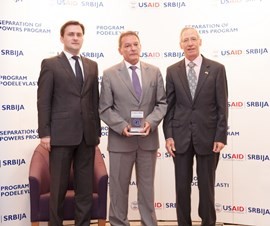
For Immediate Release
BELGRADE – Ambassador Michael D. Kirby celebrated Supreme Court Chief Justice Dragomir Milojević’s contribution in improving case processing efficiency and court management on Friday, June 13, 2014 in Belgrade at the Judicial Reform Honors Luncheon, organized by the USAID Separation of Powers Program (SPP).
Since 2009, the SPP has worked with the Higher Courts in Belgrade, Novi Pazar, and Subotica, and the Basic Courts in Čačak, Niš, Sremska Mitrovica, Subotica, Užice, Vranje, and Vršac, to streamline procedures and increase responsiveness. Those ten courts have achieved a dramatic 40% reduction in old cases, and an impressive 30% increase in case management efficiency.
At the end of 2013, out of the 3.4 million pending cases, more than half had been on hold for more than two years. Building on the success of its partner courts, and heeding the call of the National Judicial Reform Strategy, the Supreme Court of Cassation adopted the National Backlog Reduction Plan, which calls for an ambitious 80% reduction of all pending cases that are more than two years old by 2018.
“Helping strengthen Serbian democracy is one of our highest priorities at the Embassy, and your work in the judiciary is critical to that success: judicial independence, criminal justice reform, combating corruption, and improving the effectiveness, transparency, and accountability of government institutions are all vitally important,” said Ambassador Kirby.
Ambassador Kirby also praised the three courts that introduced the innovative technique of electronic filing – the Basic Courts in Subotica and Užice and the Commercial Court in Zaječar. The three courts are part of a pilot project initiated by the SPP to develop legal and secure electronic communication between courts and attorneys. These new solutions bring significant cost savings in printing and postage and improve service due to faster exchange of documents.







Comment
Make a general inquiry or suggest an improvement.